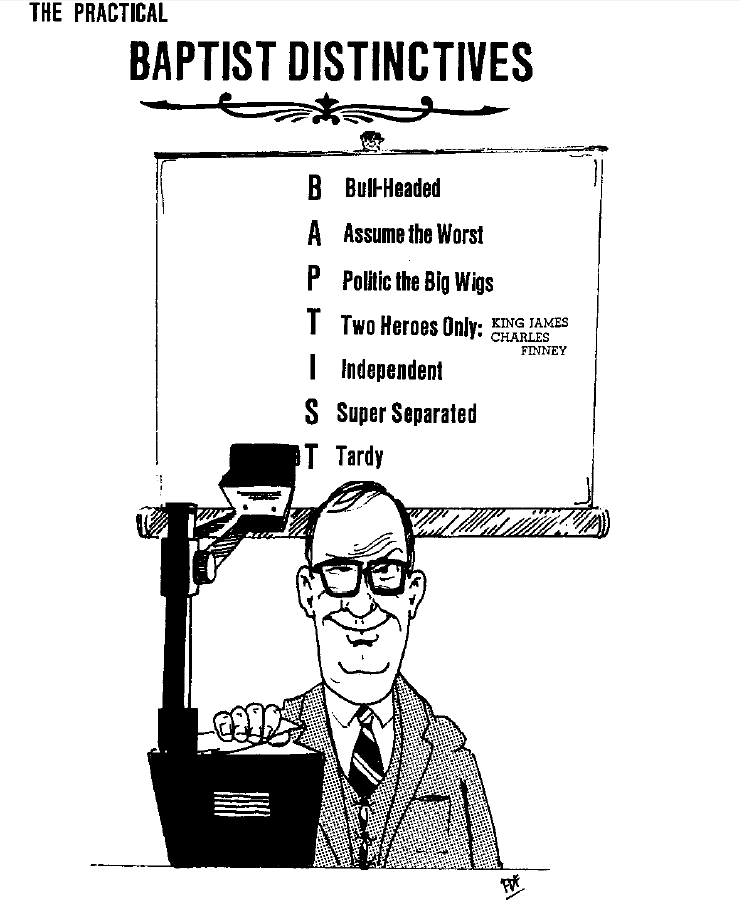Or feel free to make up your own list.
Tag Archives: Baptist Distinctives
Baptist Distinctives Day 2: Autonomy of the Local Church

While most (although certainly not all) fundamentalists acknowledge that the universal church is composed of all believers in all places and times, on this side of eternity Independent Baptists are theoretically dedicated to staying as far away from most other Christians as possible. The fear is that if too many Christians get together, they’ll attempt to form a denominational unit and immediately set to dictating policy to individual churches, thereby grieving the consciences of members who have deep personal convictions about matters such as the correct way to pronounce “Johannine.”
Instead of having a denomination which binds churches together in matters of doctrine, fundamentalists instead have fellowships, conferences, and knitting circles wherein the members attempt dominate each other in pretty much every area except legitimate doctrinal concerns. By gum nobody is going to tell the preacher of an independent local church how orthodox his ecclesiology is but (unless he’s the son of a famous preacher or a regular contributor to conference news publication) they will spend four hours questioning him about his decision to move his services from Wednesday to Thursday. We’ll never tell you how to run your church…except for all the times we will.
As one might imagine, fundamentalist camps and conferences split, fracture, and fissure almost as frequently as the churches contained within them do. When you get that many men who fancy themselves as prophets, priests, and kings under one roof there’s bound to be trouble. But not to worry. No matter how much conflict may arise outside the gate, a pastor can always scurry back home to his personal empire where none shall say to him “what doest thou?” and where he’ll never have to justify his actions to anybody.
Autonomy means never having to say you’re sorry.
Baptist Distinctives Day 1: Biblical Authority

Fundamentalists believe that the inspired words of God were written down by holy men and transmitted to us in an inerrant, inspired, perfectly preserved text of the Bible. The Bible was then translated word-for-word exactly from the original languages into English with absolutely no meaning whatsoever lost (unless a Greek translation is really needed to help a shaky sermon point). This Bible is given lip service as the perfect standard for all belief and practice within every Independent, Fundamental, Bible-Believing, New Testament, Eagerly Awaiting Either The Rapture Or Dinner Time Whichever Comes First Baptist Church.
In reality, however, a fundamentalists really only needs to acknowledge the authority of Scripture in three key areas:
1) The pastor is right.
2) The Bible says whatever the pastor says it does
3) If the pastor’s interpretation sounds a little weird, illogical, or downright heretical refer to point one.
Using this simple formula, fundamentalists can claim that the Bible is their absolute standard for faith and practice no matter what silly or anachronistic path that made lead them down. The Bible may forbid everything from cosmopolitans to chat rooms and from CCM to children’s church. It may command door-to-door soul winning and three services per week. It may regulate everything from birth control to bathing suits. And it does all this without ever actually forbidding or commanding any of those thing in any way shape or form. It’s a good thing we have pastors.
The Bible may still be on prominent display in fundamentalist churches but both their faith and practice more often seem to spring from the mind of man than from the Word of God. Yet every jot and typo receives the status of “biblical” — so it must be in the Scriptures somewhere. If only the rest of us could be blessed enough to see it.
